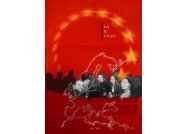turkish-greek civic dialogue - AEGEE Europe
turkish-greek civic dialogue - AEGEE Europe
turkish-greek civic dialogue - AEGEE Europe
Create successful ePaper yourself
Turn your PDF publications into a flip-book with our unique Google optimized e-Paper software.
164<br />
DISCUSSIONS IN WHICH GREEK STUDENTS PLACED<br />
THEMSELVES IN TURKS’ SHOES:<br />
? Why should the Greeks be demonised in the history books in Turkey?<br />
There were two major scapegoats for the Republic of Turkey to find a reason<br />
for all the problems the state faced. The first scapegoat was the Ottoman<br />
Empire and the second one was the Greeks. We found 5 major reasons:<br />
1. Turkish Republic was trying to create new nation state and it was clear<br />
to find an “Other” within the Orthodox Christian Greeks. Rest of the<br />
nations of the former empire were all “our Muslim brothers”.<br />
2. Greeks have the strongest claims on Asia Minor amongst the nations that<br />
invaded Anatolia. The major powers have economic interests and they<br />
had to leave at some point. Greeks, on the other hand, had historical<br />
and population claims therefore they could do more damage to the<br />
creation of Turkish national image and the Turkish nation state.<br />
3. Definition of Turkish nation- we must define ourselves – what we are and<br />
what we are not. The Turks and the Greeks are too similar in terms of<br />
culture, tradition, history. Therefore, we must create differences and<br />
define ourselves based on the differences. Defining ourselves as<br />
“non-Greek” as well as “non-Ottoman” helps to define our identity far<br />
more clearly.<br />
4. If Greeks are shown as the villains, their lives in Asia Minor would become<br />
worse and they would decide to leave and hence the government would<br />
find extra income to pay back our debts and looking for some income.<br />
5. Greeks were the first to emancipate from the Ottomans as a result of<br />
the uprising and can be seen as the legitimisation of the actions.<br />
DISCUSSIONS BETWEEN<br />
THE GREEK TURKS & THE TURK GREEKS<br />
Sonay: ‘There was no Turkish minority during the Hellenic times, this<br />
region belongs to us (Greeks) and we need to take our land back’<br />
Andreas: ‘They always want us to remember the history. We (Turks) are here<br />
to decide our own parts for our own future including the Cyprus<br />
issue’.<br />
Emir: ‘Forces may send their troops to restore the peace so we (Greeks)<br />
have right to go there to stabilise that region. In Anatolia there was<br />
disorder and we had the right to go there.’<br />
Erdem:’We are proud of the roots of the modern society and ancient Greeks<br />
lands under Turkish control, so we should invade this region because<br />
we owned it anyway.’<br />
Kostas:‘We have the war and the <strong>Europe</strong>ans are thinking they (Christians) are<br />
better than us but it does not reflect the facts because who decides<br />
who is better. ‘<br />
CONCLUSIONS ON THE CASE<br />
Vangelis Kechriotis:<br />
We need to define ourselves against the other through expressing ourselves<br />
to “the Other”. All nations had their own interests in their things and the<br />
international treaties give the rights to do so. Actually it is the foreign powers<br />
that are using us. In that case Greeks wanted to unify the area and Turks did<br />
not want to lose its control. There were the concepts about the modernisation,<br />
the values of the modernity since there was a new nation born. None of the<br />
parties accepted the nationality and ethnic identity of “the Other”.<br />
Cem Karadeli:<br />
The way one side perceives “the Other” is very important and has to be taken<br />
into account. It is important to assess the relations under the influence of<br />
foreign factors not only because Britain was the scapegoats or the great power<br />
but also because of the Wilson principles: the principle of the self determination<br />
– rightful claim to defend. The same principle may be used in the opposite way<br />
to justify the actions of invasion.<br />
If major powers were not in the table, wasn’t it possible to handle the<br />
problems?<br />
Cem Karadeli:<br />
It is not always good to blame the great powers for everything. Nations have<br />
their own preferences. 600 years ago when Turkey was invading those lands,<br />
there was not such an international community, there were no objections.<br />
What we are doing was normal. We always talk about the influence of the great<br />
powers but their interest may also change depending on our action.<br />
Final Conference Association des Etats Généraux des Etudiants de L’<strong>Europe</strong>







